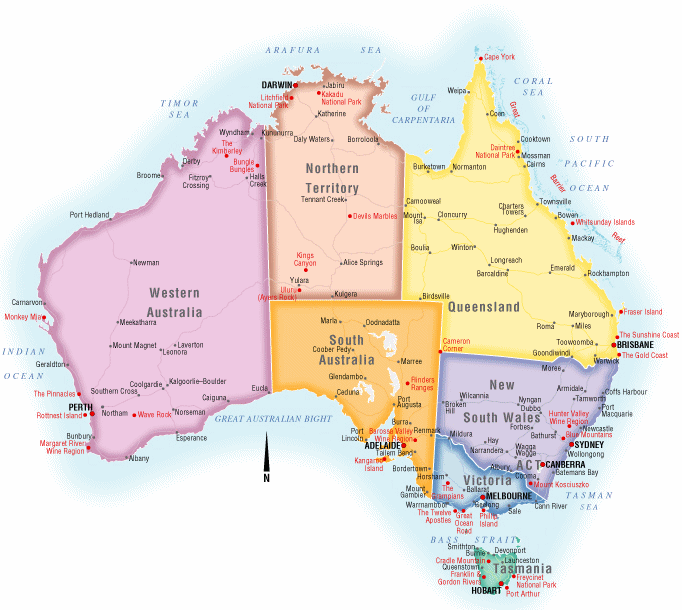 Australia has a rich history and culture with a delightful blend of Western, Eastern and Aboriginal influences. Each of these significant influences comes together to deliver a celebrated diversity and distinctive way of life unmatched elsewhere in the world. During your Australian studies it will be impossible to resist the urge to steal away and explore cosmopolitan cities, rain forests, villages, the rough and tumble Outback, and some of the most diverse landscapes found anywhere on the planet. Australia is perhaps the only place in the world where you can enjoy exquisite international dining, explore open air markets, lounge on the beach, pet a kangaroo and swim in a crocodile’s home all in the same day.
Australia has a rich history and culture with a delightful blend of Western, Eastern and Aboriginal influences. Each of these significant influences comes together to deliver a celebrated diversity and distinctive way of life unmatched elsewhere in the world. During your Australian studies it will be impossible to resist the urge to steal away and explore cosmopolitan cities, rain forests, villages, the rough and tumble Outback, and some of the most diverse landscapes found anywhere on the planet. Australia is perhaps the only place in the world where you can enjoy exquisite international dining, explore open air markets, lounge on the beach, pet a kangaroo and swim in a crocodile’s home all in the same day.
Student's Guide to Australian Culture and Lifestyle
International students from around globe come to Australia each year for the opportunity to study and immerse themselves in Australian culture and lifestyle. To make the most of this rewarding once-in-a-lifetime experience, students should learn as much about Australia as possible before they arrive.
Here is a primer on Australian culture and lifestyle that will help international students prepare for their year or semester abroad.
Language in Australia
Australia’s national language is English, but students from other English-speaking countries may quickly find that accent is not the only aspect of language that differentiates Australian English from their own native tongues.
American English speakers, for example, will discover many vocabulary differences. Sweaters may be referred to as “jumpers,” and cookies are called “biscuits.” Friends may be called “mates” or “cobbers.” These colloquial differences should not cause any serious communication barriers, though they may lead to a minor misunderstanding or two.
What may be more difficult to grasp are the spelling rules that American English speakers will encounter in Australia. Australian English most closely follows the spelling rules of British English. Rules call for the inclusion of a “u” in words such as favour and colour, the substitution of “s” for “z” or “c” in words such as recognize and practise, and the transposition of the “r” and “e” in words such as kilometre and centre.
For this reason, even English-speaking international students may want to invest in an Australian English dictionary or other Australian language reference book.
Seasons and Weather in Australia
The mainland Australian continent is 7.7 million square kilometres, large enough to host a wide spectrum of climates depending on geography and season. For example, Australians experience sub-zero temperatures in their country’s snowy mountain regions and tropical climate conditions in its northernmost regions.
In general, however, much of the continent’s weather can be described as moderate, with winters that are mild compared to those in the northern hemisphere and which occur while the northern hemisphere experiences summer. Winter season is June through August, and summer is December through February.
International students will find that Australia’s weather affects its semester schedules, which start in February and July and may differ from semester schedules in their home countries.
Religious Worship in Australia
Australia has no official religion, and its people are free to practise any religion they choose. The majority of Australians identify themselves as Christians, but Australia’s freedom of religion, its sizeable immigrant population, and a general religious tolerance amongst its people mean that most of the world’s major religions are represented throughout the country.
Students who practice non-Christian religions may inquire with their host universities’ departments of international studies about the nearest houses or temples of worship where they may practise their own religions during their time in Australia.
Australian Manners and Social Expectations
Australians are often described as an informal people, but this does not mean that courtesy and decorum are not appreciated, and these characteristics are, in fact, expected in all social situations. Australians say “please” and “thank-you,” stand in orderly lines for goods and services, shake hands upon meeting and value punctuality. Australians respect personal space and frequently converse at arm’s length, particularly with strangers or casual acquaintances.
Australia enforces laws against littering and spitting in public places, and smoking is prohibited inside most buildings, on public transport and at some entertainment venues. Unless explicit permission is given, it is best not to smoke in public places.
Many public events and arenas will find Australians in casual, comfortable dress, although certain special events and workplaces will require more formal attire. It is perfectly acceptable to wear jeans or sandals, for example, in most venues; however, it is also appropriate to inquire about dress code if you are invited to an event or begin a new job in Australia.
Leisure and Entertainment in Australia
Australians enjoy diverse and plentiful entertainment options, including fine arts performances and sporting events. They attend movies, musical concerts representing a variety of genres, live theatre performances, dance recitals, artwork exhibits and more. The most popular sports both to play and watch are Australian football, rugby and cricket, although fitness conscious Australians also enjoy tennis, soccer, aerobics, golf, cycling and dozens of other physical activities.
As mainland Australia is an island continent entirely encompassed by water, it is not surprising that water and beach activities such as swimming, surfing, boating and fishing are popular with Australians. Residents also enjoy unstructured leisure time and may shop merely for fun, or they may gather friends and family for a backyard barbecue.
The international student who fully embraces all that Australia has to offer will gain much from the study abroad experience. Although international study may present challenges and even, at times, discomfort or culture shock, the rewards will be life-changing and long-lasting.

 Welcome to Australia Click here to view a map of Australia
Australia is the largest island and the smallest continent in the world. It lies between the Indian Ocean and the South Pacific Ocean. It is about 11,000 kilometers southwest of North America and 3,200 kilometers southeast of mainland Asia.
The population of Australia is almost nineteen million. More than four-fifths of the people live in cities and towns that are generally in coastal areas near the mouth of a river and as close as possible to a good ocean harbour.
Welcome to Australia Click here to view a map of Australia
Australia is the largest island and the smallest continent in the world. It lies between the Indian Ocean and the South Pacific Ocean. It is about 11,000 kilometers southwest of North America and 3,200 kilometers southeast of mainland Asia.
The population of Australia is almost nineteen million. More than four-fifths of the people live in cities and towns that are generally in coastal areas near the mouth of a river and as close as possible to a good ocean harbour.


